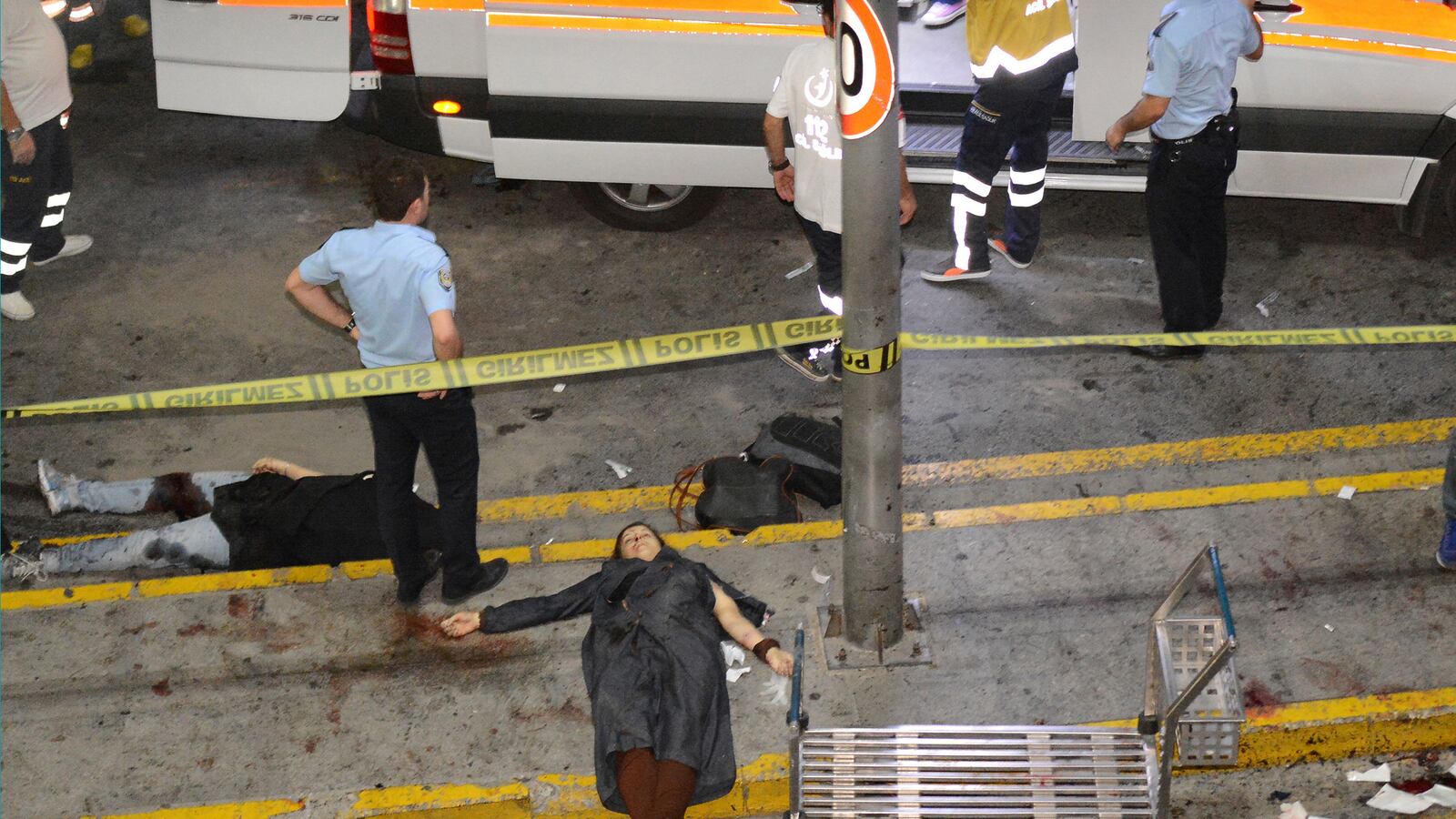More than two dozen people were killed and several others were wounded Tuesday evening when suicide bombs and gunfire rocked Istanbul's Atatürk International Airport, Turkish officials said.
Vasip Sahin, the governor of Istanbul Province, said at least 41 people had died in the attack and more than 230 others were injured. He also stated that there were three suicide bombers involved—two inside the terminal, and another at a nearby car park. According to officials, the unidentified attackers detonated their bombs near a terminal entrance after police officers guarding a security checkpoint began to fire at them.
Pictures and videos posted to social media showed travelers panicking, taking cover, or fleeing the scene. Several were immediately wounded and taken to safety by taxi drivers, according to witnesses, who said additional gunfire came from the car park.
Closed-circuit television camera footage from the airport captured the moment the suicide bombs detonated, setting off a powerful inferno in the terminal and prompting travelers to quickly flee the area. A video posted on Twitter appears to show emergency officials tending to the injured in the attack’s aftermath.
A White House official said President Obama was briefed on the attack by Lisa Monaco, his assistant for homeland security and counterterrorism. The U.S. embassy in Ankara, Turkey's capital, issued a travel advisory to Americans on Monday, specifically warning of "increased threats from terrorist groups throughout Turkey." The embassy also advised U.S. citizens to avoid traveling to southeastern Turkey and the border with Syria. Istanbul is in the country's northwest.
CNN Turk reported that, at the request of the prime minister, a temporary gag order on Turkish media reporting about the airport attack was put into effect. All scheduled departure flights were immediately canceled, while incoming planes were diverted to other Turkish cities, including Ankara. The airport reopened on a limited schedule early Wednesday morning.
The Eurasian country has suffered a string of deadly attacks in recent months, including suicide bombings in Istanbul that were claimed by ISIS, as well as car bombings carried out by a Kurdish militant group in tourist areas in Ankara. A January bombing in Istanbul's Sultanahmet Square killed 12 people. Earlier this month, a car bomb ripped through a busy tourist section of the city, killing 11. In Ankara, car bombings killed 28 and 37 in February and March, respectively.
Including Tuesday's attack in Istanbul, there have been at least eight major terror attacks in NATO countries since the coordinated bombings and shootings in Paris last November. At least six of those took place in Turkey, and Tuesday's is the fourth in Istanbul this year alone.
Photos: Airport Slaughter: Terrorists Kill 36

The most recent wave of terror attacks began when ISIS attackers armed with assault rifles and explosives targeted six locations in Paris last November. The coordinated assaults killed 130 people and wounded hundreds. The ISIS-inspired mass shooting in San Bernardino took place less than a month later.
Over two consecutive days in January, a combined 16 people died in an attack by an ISIS suicide bomber and clashes between Turkish police and PKK militants. Three suicide car bombings—two claimed by a Kurdish group and another by ISIS—took place in February and March. Thirty-two people died and hundreds were injured when ISIS attackers detonated three coordinated bombs in Brussels on March 22. Earlier this month, a gunman who public pledged allegiance to ISIS leader Abu Bakr al-Baghdadi killed 49 people and wounded 53 others at an LGBT nightclub in Orlando.
Turkey is a part of the U.S.-led coalition fighting ISIS, and also faces internal battles against militants from the Kurdistan Workers' Party (PKK)—deemed a terrorist organization by the United States and the European Union—seeking independence for the Kurdish people.
Two U.S. officials told The Daily Beast they had no intelligence information to immediately identify the attackers, while saying privately that they suspect ISIS was behind the attack. A PKK attack on civilians is unlikely, as it would have the potential to kill Kurds. While the PKK does not usually carry out such attacks under its own name, splinter groups have taken responsibility for past bombings, including two in Ankara.
Istanbul is Turkey's largest city, and Atatürk International Airport is one of the world's busiest in international air traffic. It is Europe's third largest airport and a common connecting point for international travelers—which means that an attack on this airport is bound to have ripple effects around the globe.
According to CNN correspondent Ivan Watson, who has traveled extensively through Istanbul, the airport is extremely secure. Travelers must pass through a police checkpoint just to get on the property, and an additional round of metal detectors before entering the main terminals.
—with additional reporting by Nancy A. Youssef and Alexa Corse




